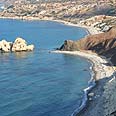
Israeli tourists in sights
Op-ed: Tight security around Israeli officials prompts Hezbollah to focus on easier targets
According to media reports, a member of Hezbollah’s international terror apparatus nabbed in Limassol attempted to spot vulnerabilities that would allow for maximal damage among a group of Israeli tourists in their first hours in Cyprus. These tourists could have been hurt upon leaving the plane or cruise ship, while staying at the terminal, while boarding buses and heading to one of the popular resorts on the island, or at the resort. Limassol itself was not necessarily the target of attack.
This is not the first time Israeli tourists in Cyprus are in Hezbollah’s sights. Three months ago, a warning was issued regarding the intention to hurt Israeli tourists in the country, yet it was apparently not solid enough to justify a travel advisory.
The thwarting of the attack was a successful intelligence operation. One of the keys to its success, according to reports from Cyprus, was cooperation between spy agencies and states. Cypriot media outlets reported that Israel’s Mossad was involved in this operation.
The latest incident in Cyprus is one link in the chain of a terror wave that has lasted for several years now. This wave is fueled by different elements every time: Once it was the assassination of Imad Mugniyah in 2008, and another time it was about the elimination of Iranian nuclear scientists in the past two years.
This is a persistent terror effort headed by the familiar coalition made up of Iran, Lebanon, and Syria. Regrettably, in the past two years they were joined by Turkey, which has become a senior collaborator to Iranian and Lebanese terror. Turkey serves as a convenient platform for terror groups: Both as an organizational base and as a point of transfer to targets in other countries. Everything is done with the encouragement and knowledge of Turkish authorities.
Learning from failures
The distinction between the organizations that carry out the attacks is less significant. Regardless of the perpetrators being Hezbollah men, the Revolutionary Guards, Iran’s intelligence agents or local terror groups that receive funds or political and military support from the terror coalition, all of them constitute a joint target for counter-terror activity by global intelligence agencies.
The terror coalition states extend two arms to main hubs: One arm is sent to Southeast Asia – Indonesia, Malaysia, Thailand and India. The other arm is directed at European states such as Cyprus, Greece, Bulgaria and Italy. There are other terror spots on the global map as well: In South America, in Africa, and in the Sinai.
In the past year, the terror coalition emphasized attacks on official Israeli institutions and Israeli symbols such as embassies, diplomats and Chabad homes. Yet the failures of the past year prompted the coalition to draw lessons: These official targets are surrounded by tight security. Hence, in order to carry out a quick and painful attack, which would punish and deter Israel, one needs to go back to the soft underbelly: Israeli tourists.
This coalition attempted to target Israeli tourists in the past too, in Turkey, in Bulgaria’s ski resorts, in Cyprus and in Greece. Now, it’s back to Cyprus, which is a convenient target for a quick attack: Less than an hour’s flight to Beirut.










